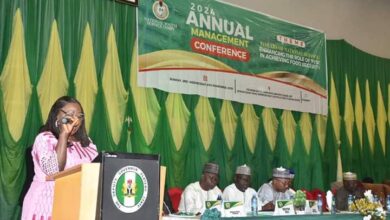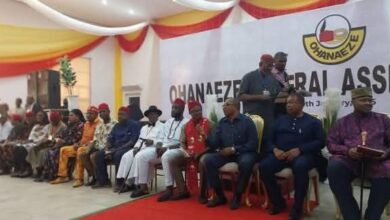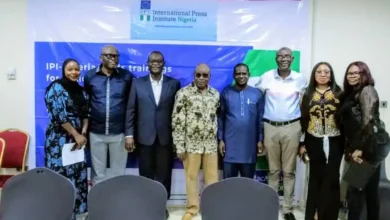Don Jazzy Sparks Debate: DNA Testing Before Naming Ceremonies Essential for Family Truth and Stability

Don Jazzy’s Bold Statement on DNA Testing and Paternity In a recent statement that has sparked considerable debate, Nigerian music mogul Don Jazzy emphasized the importance of DNA testing over traditional naming ceremonies, urging parents to prioritize genetic verification. According to him, establishing a biological connection should take precedence to prevent future conflicts and uncertainties within families. The artist, known for his straightforward views, shared his perspective across social media platforms, igniting discussions on paternity, parenthood, and the cultural relevance of DNA testing.
Naming ceremonies have deep cultural roots, particularly in African societies where they signify the formal acceptance of a child into the family. These ceremonies are not merely a celebration but also serve as an avenue to introduce the child to extended family and community members. However, Don Jazzy’s stance raises the question of whether these symbolic rites should come before practical measures like DNA testing, especially in today’s world where parental identities are sometimes disputed.
DNA Testing
The Role of Science in Family Identity and Stability DNA testing provides a scientific approach to confirm biological relationships, bringing clarity and avoiding potential issues surrounding paternity claims. A DNA test is a straightforward, accurate, and reliable method to determine a child’s parentage, significantly reducing the likelihood of familial conflict later in life. Many advocates argue that verifying biological relationships fosters trust and transparency within family units, leading to stronger, more cohesive familial bonds.
Despite its accuracy, the acceptance of DNA testing remains mixed. In some societies, questioning paternity is viewed as a sign of mistrust or disrespect, adding layers of emotional and cultural complexities. For celebrities like Don Jazzy, with influence in public discourse, the push for DNA testing signifies a movement towards prioritizing factual family structures over potentially damaging assumptions.
Traditional Naming Ceremonies
Their Cultural Significance and Societal Role Naming ceremonies hold profound cultural importance, especially in African societies where a child’s name carries deep meanings and represents the family’s heritage. Traditionally, this event is not only about bestowing a name but also a recognition of lineage, legacy, and acceptance within the family. These ceremonies are joyous occasions symbolizing the child’s integration into the community and connecting past and future generations.
However, critics argue that without confirming biological ties, the naming ceremony might prematurely place a child within a lineage that may not be theirs. For some, introducing DNA testing as a precursor to the naming ceremony is an acknowledgment that society must balance tradition with the realities of modern life. By bridging these cultural practices with scientific verification, families can embrace tradition with a sense of security and assurance.
Public Reactions
Social Media Buzz and Mixed Views on Don Jazzy’s Statement Don Jazzy’s comments stirred a mix of reactions on social media, where users expressed varied opinions on his stance. Supporters commended the musician for his pragmatic approach, highlighting that DNA testing should be normalized as a responsible first step in ensuring familial honesty. Many fans resonated with his viewpoint, agreeing that DNA confirmation could prevent cases of mistaken paternity and the emotional strain such misunderstandings can bring.
Conversely, others criticized Don Jazzy’s remarks, viewing them as undermining the sentimental and spiritual aspects of traditional ceremonies. For some, the suggestion to conduct DNA testing first seemed a stark departure from the celebratory essence of naming ceremonies, which have been cherished rituals passed down through generations. This debate underscores the evolving tension between tradition and modernity in African societies.
The Rising Trend
Increased Demand for DNA Testing Among Nigerian Families Across Nigeria, the demand for DNA testing has surged in recent years, reflecting a shift in societal perspectives on paternity and family identity. Factors like urbanization, exposure to global media, and the impact of high-profile cases of mistaken identity have influenced more families to opt for genetic testing. Many parents now see DNA testing as a practical step in safeguarding their children’s interests and ensuring legal clarity around inheritance and familial bonds.
This trend is not confined to Nigeria; many African countries are witnessing similar shifts. The concept of DNA verification before naming ceremonies, while controversial, reflects a growing awareness of genetic science and its applications. For figures like Don Jazzy to vocalize support for this practice could further drive its acceptance, influencing cultural practices surrounding family structures and legacy.
Future Outlook
Can Tradition and Science Coexist in Modern Family Practices? The question remains: can DNA testing and traditional naming ceremonies coexist within a framework that honors both scientific accuracy and cultural significance? As more Africans embrace technological advancements, there is potential to integrate scientific practices with cultural rituals in a way that maintains respect for both. Don Jazzy’s stance, though polarizing, highlights a conversation around evolving family practices in the face of modern science.
To strike a balance, some propose that DNA testing could be a private affair within families, followed by the public naming ceremony that acknowledges the child’s identity within the family tree. This approach could allow families to honor tradition while ensuring factual accuracy. Ultimately, as societies grow and adopt new practices, the challenge will be blending cultural heritage with emerging values of transparency and accountability.
Discover more from OGM News NG
Subscribe to get the latest posts sent to your email.




